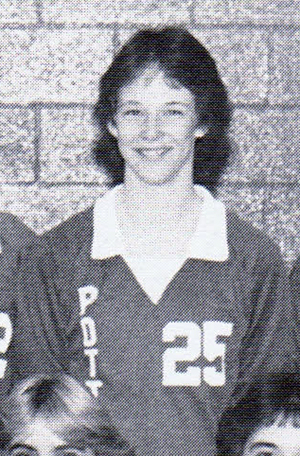
Robin Sayre 1983-84 School Year.
INTRODUCTION from the Saturday August 27, 1994 ELHS Athletic HOF bio.
ROBIN SAYRE
CLass OF 1986
Robin was graduated from the ELHS in 1986 and went on to participate MVP Bethany College for four years in basketball, volleyball, and softball. She received the Merrill Hall award her senior year and was MVP in both volleyball and softball, while being named to the OVAC All-Star team in basketball and volleyball
Sayre was first team All- County in volleyball and softball both her Junior and Senior years, as well as first team member of the Eastern Buckeye league in volleyball and softball for two years.
At Bethany, she was named to virtually every Presidents Athletic Conference All-Star team in each of her major sports.
She was the girl's softball coach at ELHS, where she also, previously served as reserve basketball coach.
The following is a combination of a short article written by Dr. Pietryk exclusively for this site, a recorded phone interview with us and Dr. Pietryk and some online sources.
Growing up:
by Dr. Robin Sayre-Pietryk:
I grew-up in East Liverpool, OH in the 70's and 80's. I was what you would call a true "Tomboy". I loved running, jumping, and throwing. Anything I could do to be active, I was going to do it. Where it came from, I do not have a clue. In the 70's there was not much opportunity for girls to play sports. I definitely did not gain an interest in sports by watching girl's sports on TV. Reaching back in to my memory, I can only make a few guesses to what might have led to the sports interest.
My father was not active, or for that matter, even in to sports at all. I think that came from being raised by his Grandmother and having only females around him as a kid. My mother did not have the opportunity to play sports, so I do not think it was from her. There must have been some athleticism and love for sports somewhere in the gene pool, but I do not know where. Although I didn't know it as a kid, my mom did have a deep love for the Pittsburgh Pirates and loves watching the games. She has told me that her mom was a huge fan of the Pirates, also. I believe my love for baseball stems somewhere from the two of them; although, my Grandmother died when I was very young and I don't remember much about her.
As a coach today, I can see many things I did as a child that could be used as training and practice activities. For instance, I used to jump and try to touch the top of every doorway that I walked through. I was only trying to touch the ceiling, but was able to increase my vertical at the same time. In the early years, I would spend many hours by myself either shooting baskets in the front of the garage or throwing a tennis ball at the back of the garage. The garage took a beating, but it helped me to be whom I am today.
OPPORTUNITIES
School provided the opportunity to play kick ball. In my mind, I was one of the best kickball players on the playground. Every kid probably thought that, but I can tell you that there were many boys picked after me. Another opportunity came from the boys in the neighborhood. I grew up on Maine Blvd. where there were more boys than girls. We played games like tackle football, kickball, Indian ball, baseball, etc. I knew I had to be tough because I didn't want the boys in the neighborhood to think I was weak.
The first real organized chance to play a sport came when I was in the 2nd grade. I can still remember it like it was yesterday. Two men came to my classroom to talk about signing-up to play minor league baseball. I was never so excited in my life to realize that I might be able to play baseball. I went home and begged my mom to let me try-out. I don't think I ever wanted anything as bad as I wanted to play baseball.
I'll never forget going to the football field by the pool at Thompson Park for tryouts. All I had was a little plastic glove that probably came from Hills. My memory begins to fail me on how well I did at practice, but I can tell you I was nervous and didn't know much about baseball at the time. There was one other girl there and her Dad played baseball and knew everyone. When I look back at it now I never had a chance. They weren't going to keep more than one girl and my Dad didn't know anyone. Needless to say, I didn't make the team and I cried. I was devastated and mad. By the way, that one girl never played sports again.
Although the initial experience with trying out for baseball was disappointing, I never lost my love for it. I continued to play imaginary games with the back of the garage and a tennis ball. Maybe deep down I was determined to someday prove somebody wrong. It took three years for me to convince my Mom to let me try out again for a team. I was in the 5th grade when I brought the brochure home and again begged to be allowed to tryout. This time, it was little league baseball at the complex. I was picked to play for a team called Burger Chef. I don't remember where the tryouts were or even much about them. However, I do remember coming home excited because everyone was going to make the team.
I didn't do too bad and actually played quite a bit. I do remember the boys picking on me some, but it wasn't enough to stop me from playing or scar me for life. I don't know whether it is true or not, but I felt that I had the respect of those same boys by the time we reached High School. I only played two years of little league and decided to not play at the next level, but played slow-pitch for a city team. I was also starting to play middle school sports.
In the 7th grade I tried out for basketball and did not make the team. I'm not sure the coach had a clue about talent because the team never won a game. I also ran track that year. I found out that there was an award given out to the top male and female athlete at the end of the 8th grade year. I decided I wanted to win it, so I went out for volleyball for the first time. I really enjoyed volleyball. I tried out for basketball again and not only made the team, but was the leading scorer on a winning team (really makes you wonder about the 7th grade coach). I again ran track. I did win the best female athlete at the award's assembly at the end of the year. This was only the beginning of a long career in playing sports.
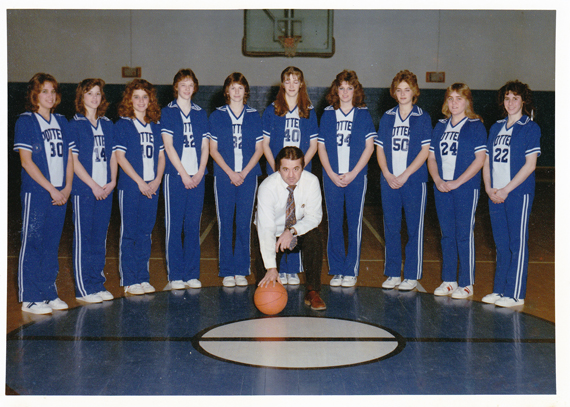
Basketball Pix: Row 1: Bob Babish Row 2: ?, Jodie Adrason, Lynne Wilson, Robin Sayre, Amy Hutchman, Carrie Tice, Marci Hornick, Barb Lang, Kay Burke, Cathy Fineman
THE PHONE INTERVIEW
WE: What is Indian ball?
ROBIN: Oh, Indian Ball, you never played that? You have to come up to bat and you toss the ball up into the air and you have to hit it, and then if it gets caught that guy became the batter. Everybody was just out in the open field. If it was on the ground, you had to roll the ball back to the bat and you have to hit the bat to be able for you to get up to bat. I don't know where the game came from, it was just a game we played growing up I guess.
WE: kickball?
ROBIN: Kickball, it was basically like baseball, except we kick a ball and it's like with a playground ball.
WE: Would you consider yourself competitive?
ROBIN: Oh yeah! Yes, I definitely would.
WE: I would guess at least a couple examples of that might be the disappointment not making the team in 2nd grade and that 7th Grade teacher/coach?
ROBIN: yeah, he wasn't around very long.
WE: Sounds like you were really mad about it.
ROBIN: Oh, I was, I was furious because I knew even at that time, I knew it was wrong and all the other kids knew it was wrong but there was nothing we could do.
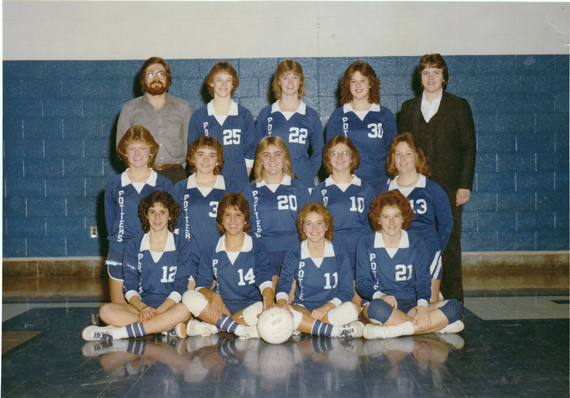
83-84 Volleyball Pix: Row 1: Cathy Fineman, Robbi Jo Mitchell, Amy McCormick, Lisa Maylone Row 2: Leise Beatty, Pam Comfort, Kay Burke, Jo Ann Nentwick, Jennifer Koenig Row 3: Bob Shansky, Robin Sayre, Peggy Underwood, Lisa Sparks, Janet Toot
WE: Matt Stewart suggested this question.
WE: He said there is a desire to play, there is a desire to win, they aren't the same thing. Would you agree with that?
ROBIN: : I do agree with that. I think some times with a lot of things, you just want to play. You just want to be active, but it really doesn't matter whether you win or lose. Once you get more into more competitive sports like high school and at the college level, you want to win. Playing is important, but you really want to win. For instance, we still play noontime hoops out here. A bunch of the coaches, were still so competitive that we want to win. We want to get exercise, we want to play, we want to have fun but we want to win too.
WE: when you were playing with the boys on Maine Blvd, how old were you?
ROBIN:I would say probably, fifth-grade. We probably were around 11 years old. Now, how long that continued, I think probably until high school and there were more opportunities for girls in the girls sports at the high school. It lasted mostly through the junior high period.
WE: Can you explain your reference to minor league baseball?
ROBIN: Well, I think it was called minor league at the time. It was just like the division, it might be called midget league now.
We: Oh. Okay it was kids.
ROBIN: Kids, yes.
We: okay it wasn't like the minor league baseball after you finished high school or even college and professional team signed you to one of their farm clubs?
ROBIN: Robin: oh, no, no, no (hehehe)[Yes, Robin did laugh at this point and the taped portion of that laugh appeared as the Hehehe, I didn't make this up, honest.] but I am pretty sure it was called minor league and then you went into Little League. The names kind of escape me now. I don't know positively what specific league they were in.
WE: I was just trying to be clear on the minor league name.
ROBIN: This was in second grade, or possibly third grade. I'm pretty sure it was called minor League or something like that. I don't even know if the first one was the one out at the complex, because I remember being at Thompson Park for the one practice I was at. So I'm not sure it was run out of the complex. It may have been called the East Liverpool league at the time.
[UPDATE: Robin was correct. From Chip Zelch, "If memory serves, boys aged 7 & 8 (I think) could be in the LL Minor League. There weren't many teams, nor were there many games. It was kind of a "get ready" experience for boys who intended to join Little League at age 9." -- Webmaster]WE: so, your first really organized sports were in the eighth or ninth grade?
ROBIN: probably eighth grade. Well I ran track in seventh grade. That was only sport that I played in seventh grade.
WE: at Westgate?
ROBIN: yes, well it was East Liverpool middle school at that time.
WE: Something I'm really curious about. How did you or when did you first learn to dribble a basketball? In what you wrote there basically shooting a basketball hoop in front of your garage. Probably not a whole lot of running and dribbling involved there.
ROBIN: Yes. I don't honestly know. I don't know if we learned in gym class at North Elementary, I really don't have a clue. Is that what the question was, because I have no idea.
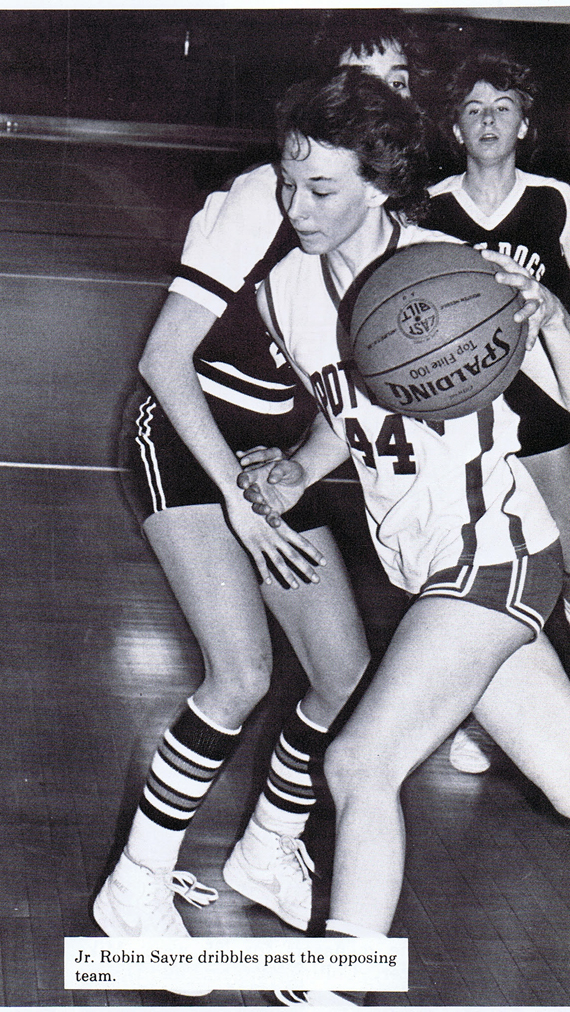
WE: The past three years we have gone to most of the boys and girls home basketball games at the high school. At least some of the girls displayed complete control and mastery of the ball as they moved about the court, a total ability to dribble and I kept thinking when, where, and how did they learn that. When and how did they develop that skill?
ROBIN: It had to start with people teaching them in the younger years. Now, like I said, with me, there were no opportunities to play until really the seventh grade. I think now there's a lot more opportunities for getting involved in things and a lot younger age, especially for girls. Now I'm not saying guys didn't have that opportunity. I don't know, as far as I know there was nothing available for girls sports. When I was growing up as far as younger early years, until you reach junior high I can tell you there was nothing. There was no intramural there was nothing for you till you reach seventh grade and that was when you actually got to play. If you learned anything, it was in gym class prior to that.
WE: These pickup games when you played with boys?
ROBIN: That was out on the playground and we just wanted to play kickball.
ME: You had mentioned football. So what about football?
ROBIN: I didn't really play much football. The only football was in the neighborhood.
WE: Tackle football or two hand touch?
ROBIN: oh. Usually it was two hand touch as I recall. I don't remember doing a lot of that.
WE: In school, high school, high school drama, peer pressure, all those quirky things about high school. How were girls who are into sports viewed by other students in my boy athletes in your days in high school? Back in my day at school cheerleading was about the only thing that girls could aspire to that would really relate to any kind of sports as such. Cheerleaders were pretty popular. They could arguably have been viewed as the top of the so-called pecking order for girls in high school.
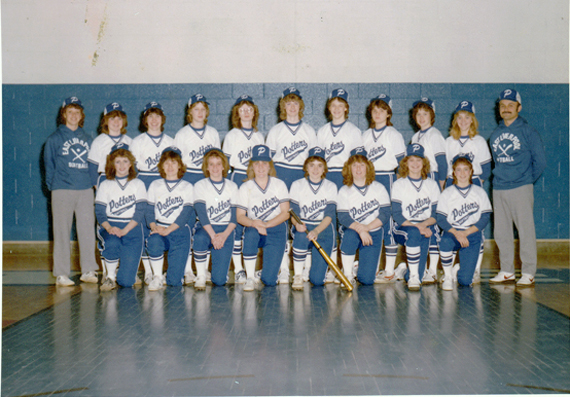
Softball Pix Row 1: Marion Feerlano, Joni Covert, Laura Mackell, Kay Burke, Pam Comfort, Jennifer Koenig, Tawny Broadbent, Amy McCormick Row 2: Jan McHenry, Lynnette Davis, Penny Nease, Michelle Beagle, Paula Jarvis, Peggy Underwood, Robin Sayre, Carin Rudar, Sharon Bosworth, Lori Wilson, Randy Calhoun (head Coach)
ROBIN: I think it depends a lot on who you hung around with. I can only speak for myself. I had no desire to be a cheerleader. They were considered to be, to me, I'm not saying they're not, at that point in time. I never considered them athletes. They were a bunch of girls who want to go watch the boys play and cheer for their boyfriend. Me, I want to go watch a basketball game, which I went to, I want to watch a basketball game. I wasn't about watching a particular person play. After I left Jr High I got involved with my first high school sport. That first one was volleyball. So I went out for volleyball and it was obviously with Coach Shansky at the time. When team cuts were done I remember thinking I had a good chance of making varsity as a freshman. When I went out I was listed on JV , but I never played JV game and I never went back down. The people I was around were all athletes at that point in time. So when I first got into to high school I was around athletes from the word go. I was around volleyball players and a lot of them moved on to basketball. Also, a lot of them, well we had track that year, so a lot of moved on to track. We didn't get softball until my sophomore year and a lot of us played softball that year. The people I was around that's what they and I did. I don't know if that totally answered your question but none of them want to be cheerleaders.
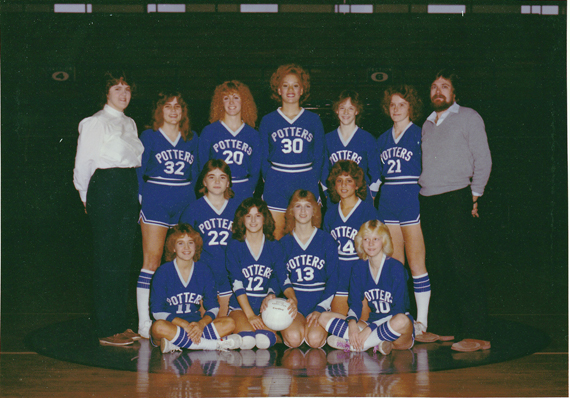
1982 Volleyball: Row 1: Amy McCormick, Beth Sine, Megan Polk, Dee Snow Row 2: Pam Comfort, Robbi Jo Mitchell Row 3: Janet Toot, Jackie Yeager, Kim Augar, ?, Robin Sayre, Lisa Maylone, Bob Shansky
WE: Well, cheerleading now is considered a sport.
ROBIN: It is and in some ways it is a sport and in some ways is the dance thing. It just depends on how they operate program.
WE: Here now, you have cheerleaders for football. You have separate cheerleaders for basketball. I once asked Dick Wolf why that was and he said that it was to allow girls who wanted to be a cheerleader and also participate in sports could do both at different times the same year. I have read or heard that the Potters have a competitive cheerleading squad as well but I don't know much about it if they do.
ROBIN: They may and that is more what I consider the sport part. A lot of people may be the same group.
WE: It would be gymnastics basically I think.
ROBIN: Correct.
We have to apologize. We began this questioning on cheerleaders without having all the facts. We were assuming that cheerleading was a regular sport and we have since discovered it isn't, at least not a Title IX sport, at least not yet. Gymnastics is a Title IX sport but not cheerleading, not in Ohio. Robyn handled our lack of facts very diplomatically. At ELHS now, as has been pointed out earlier, many time girls are athletes half the school year and cheer half the school year. EL Historical Society webmaster.
ME: Social wise in high school were girl athletes accepted?
ROBIN: Oh yeah.
WE: of course you were 10 years after girl varsity teams began at high school.
ROBIN: Correct, I was in there in the 80s. I don't remember at the time not being accepted by the boys by or others. You had some of the most popular girls playing sports at that point in time in school.
WE: I need to talk to some of those that were on those girls teams starting with 1973-74 school year see what their experiences were like. I would think that perhaps some might have caught a little static along the way.
ROBIN: They might have. I don't remember, I am sure I was given a hard time when I was younger but I was just the type of kid that I just really didn't care. You want to make fun of me, big deal. I could care less. Who are you?
ROBIN: By the time I got in high school really and to be honest with you, if you talked to some the boys and I went to school with now they wouldn't have begun to make fun of me by the time I went to high school because I was better than most of them. I think I was with a very good group of kids to be honest with you.
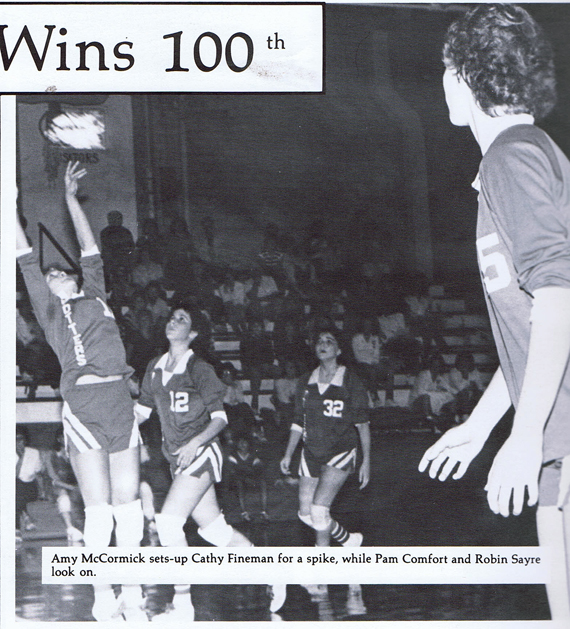
The WINS 100Tth actually said SHANSKY WINS 100th before the picture was cropped. Robin Sayre is on the far right.
WE: Attendance wise, there seems to be a large difference between the girls and boys basketball games, at least here on the high school level.
ROBIN: I think that goes almost anywhere unfortunately. I think it depends on the girls a lot. For instance I can only pinpoint what I am involved in now with volleyball. Most the girls I have are girls that are more out in the school, more involved in the school. We have a good team and we have very good crowd for our games.
WE: On TV it does seem like there are bigger crowds for women's volleyball and basketball at the college level.
ROBIN: yeah, the better the teams are. Now, for instance our teams. We don't charge a dime to get into our games, we don't charge for any of our sports to get into the games except for football. We do charge for men's basketball, but I think they let everyone in for free any ways. I don't even know that they make anything off of it. It's actually that way with all the Division III teams we play. All the conferences we go to, nobody charges.
WE: You're in Division III?
ROBIN: Yes. That goes back to that question you asked me the other day that I didn't respond to. I kind of forgot about it. I played Division III in college. I was not on athletic scholarship.
WE: Did it you play just one sport in college?
ROBIN: No. I played three in college. Most schools will not let you but if you go to a Division III school you can, and that was one of the main reasons I went to a Division III school, I wanted to play more than one sport. I didn't want to give any up.
WE: You played the same three, volleyball, softball and basketball?
ROBIN: Yes. I was by far much better in volleyball and softball than I ever was basketball.
WE: You couldn't dribble behind your back?
ROBIN: Naaaa! I can do it now, but not then. I will say with me for whatever reason I can watch what people do, and will try to do it. That type of thing. I don't remember ever being taught it. [Dribbling, dribbling behind the back, etc.] But I could've watched somebody do it and tried it, then at some point down line fine pointed it. I could've watched a basketball game on TV and know that was what you were supposed to do.
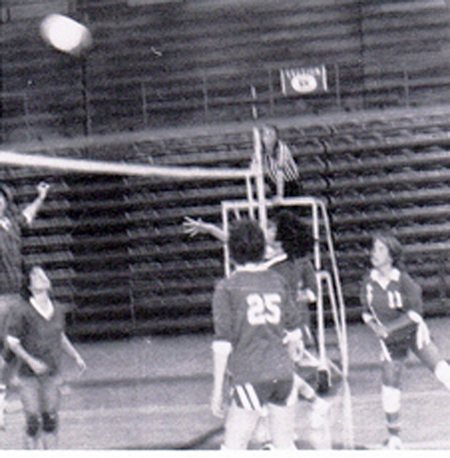
Even though the girls are not a tall team, they had no problem at the net. Robin Sayre is #25. 1984 Keramos Yearbook
WE: How do you recruit now?
ROBIN: It is difficult. It is very difficult because being in a Division III school, I cannot offer them any type of athletic money. We are talking about a school that is taking close to $30,000 to go to. I have to go out and find the kids with high academics and the best mix is high academics and low income so they can get a lot of financial aid. Volleyball players are prone to be high academics so that's not usually a big problem for me. It's very difficult, but we can go out there and try to find kids that would be a fit but is not always easy. For instance, I just hired a full-time assistant here for the first time and the person I picked is from Cleveland, Ohio. She went to Clarion University and one of the reasons I picked her is because I wanted recruit more in Ohio and Pennsylvania so we can get up in that area. The reason is, the players are better up in Ohio and Pennsylvania than they are in the South and there are a million Division III schools that are a lot more expensive than me [North Carolina Wesleyan College] in Ohio. So somebody that is not going to get that scholarship, doesn't want to eat, sleep, and drink volleyball and would like to get a good education and they can play another sport at the same time, you come South. You have better weather here and we're a bargain. We're a lot cheaper than Division III schools in the state of Ohio. So I just have to find my niche is what I have to do [recruiting in Ohio and Pa.]
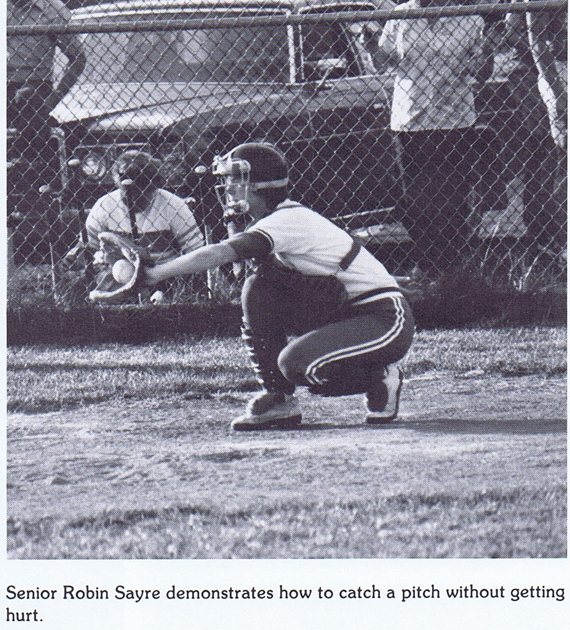
WE: You went on to make sports a career?
ROBIN: When I was in college I knew I couldn't get away from sports and I actually wanted to be in professional sports. I actually started out, first internship, was with the Youngstown Pride. They were in existence for so little time. It was a 6 foot, it must not have been 6 foot, it must've been 6 foot five or 6 foot four and under world basketball league. They play teams all over the place.
http://en.wikipedia.org/wiki/Youngstown_Pride
ROBIN:It was fairly close. So I drove up and work there and did some things out of there. It was based at Youngstown State University. When I was there though I felt like all I did was sell tickets, not a salesman, not a salesperson. Even though that is basically what I do here. I didn't really want to do this. I didn't want to get into coaching when I was in college. I had no desire for that. I felt like it was a thankless job almost. You did so much for athletes and nobody seemed to appreciate what you're doing, especially at the Division III level.
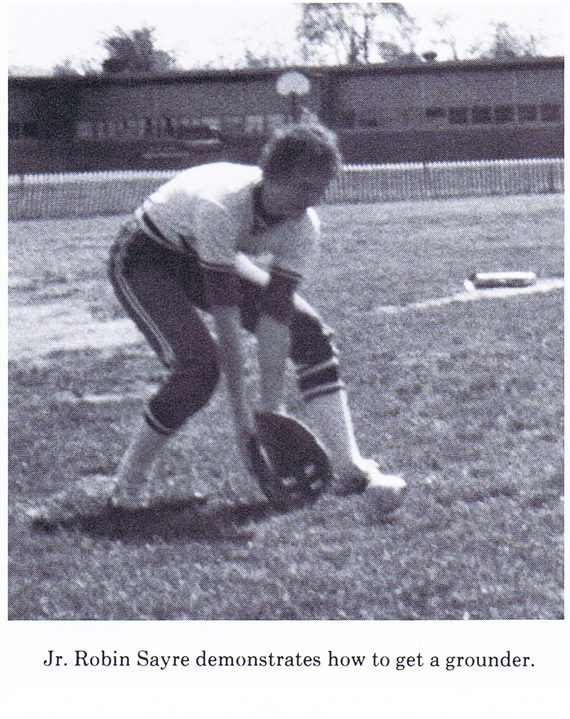
ROBIN: After I graduated I was like okay, now what do I do. My first opportunity was to coach JV basketball. Coach Huck Stefan. He had a full-time position and he hired me. I coached my little sister at that time. I really enjoyed it. That was what really got me started into coaching. I went back to get my Masters degree because I didn't want to do it at the high school level because there was too much politics involved. Way too much politics involved in high school.
ROBIN: I didn't have a teaching certificate so that also played a role in my decision to focus on coaching at the college level. I didn't want to go back all 9 yards to get a teaching certificate and teach at the high school level. I didn't need a teaching certificate to teach at the college level. I just needed my Masters degree. It's a long way from where I was when I began high school sports to where I am today.
WE: Me: You been successful from what I have read.
ROBIN: It has been successful and I'm happy with what I'm doing. Financially it doesn't pay well, does not pay well and all.
WE: They had girls sports in the early part of the 1900's and then it stopped.
ROBIN: Robin: I have seen pictures, I think in my mother's yearbook, where they had early pictures of basketball. I don't know who started girls sports back again, if it was Dick Wolf or who it was. I knew of Monica Hoschar. I did know of her and she was the one who really got things moving. I don't know who all else was in those early years. I did know Kathy Disch, who I believe just got inducted into the Hall of Fame and she was fairly fresh out of school at the time.
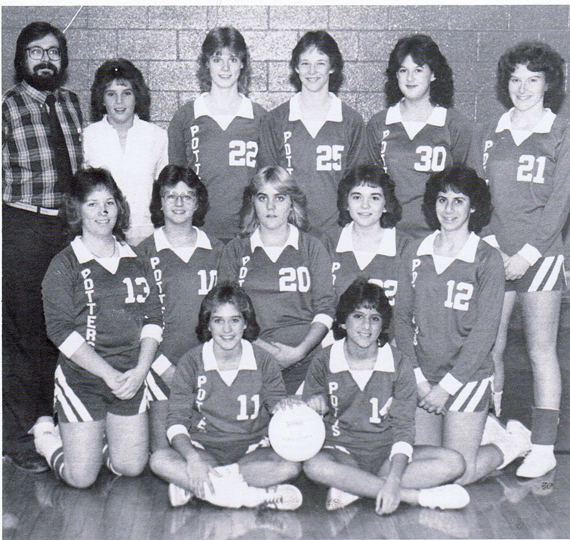
1983-84 Varsity Volleryball Team: (sitting) Co-captains Amy McCormack and Robbie Mitchell (kneeling) Jennifer Koenig, Jo Ann Nentwick, Mary Kaye Burke, Pam Comfort, and Cathy Fineman. (Standing) Coach Bob Shansky, Laura Mackall, Peggy Underwood, Robin Sayre, Lisa Sparks, Lisa Malone.
WE: I was wondering how many girls had graduated and went on to college to play sports in college. Girls that have played sports at the ELHS and went on to college and played sports there as well.
ROBIN: I know when I went to Bethany Lori Bowersock was two years behind me with basketball. She followed me there and played basketball at Bethany with me. I don't know if she is in the Hall of Fame or not , but she should be. Lori Bowersock played basketball at Bethany with me and I'm not sure if she's even recognized as moving on and playing college sports.
ROBIN: You may want to talk to Greg Adkins. He was trying to get a list together of people who played sports in college.
WE: As you know I had posted a brief introduction about title IX on the Historical Memories of East Liverpool, Ohio Facebook site. There were a few comments to it there.
ROBIN: Yeah, that thing got a life of its own. When you message me and said something about title IX, I'm thinking, oh I don't know if I even want to get in there look at this and I'm going to get mad. Their going to start talking about stuff they don't know anything about and have done so much teaching and studying and everything on this. Do I really want to get mad and start. I don't have the patience to sit there and type and get on to it constantly and stay around. I'm like , you know what I need to make sure they know about proportional numbers.
One additional question which we thought of after the phone interview. we emailed her the question:
we: we realized yesterday there was one area we never touched on and that was training. What sort of training did the girls do and how often? Not practice necessarily but rather did they do any actual training, workouts etc and if so when and where?
ROBIN: I don't remember doing much training. I do remember working with Al Johnson in the weight room a couple of times, but that is all I remember. Teams had open gyms and practices.
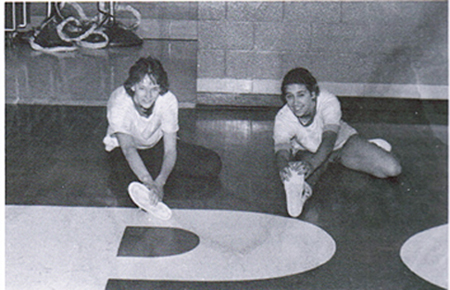
Senior Mary Ann Maple and Sophomore Robin Sayre like to loosen up before a game. 1984 Keramos Yearbook.
Continue to Growing up, From "Tomboy" to Successful Head Women's Volleyball Coach at a Div III College 2.
This site is the property of the East Liverpool Historical Society.
Regular linking, i.e. providing the URL of the East Liverpool Historical Society web site for viewers to click on and be taken to the East Liverpool Historical Society entry portal or to any specific article on the website is legally permitted.
Hyperlinking, or as it is also called framing, without permission is not permitted.
Legally speaking framing is still in a murky area of the law
though there have been court cases in which framing has been seen as violation of copyright law. Many cases that were taken to court ended up settling out-of-court with the one doing the framing agreeing to cease framing and to just use a regular link to the other site.
The East Liverpool Historical Society pays fees to keep their site online. A person framing the Society site is effectively presenting the entire East Liverpool Historical Society web site as his own site and doing it at no cost to himself, i.e. stealing the site.
The East Liverpool Historical Society reserves the right to charge such an individual a fee for the use of the Society’s material.